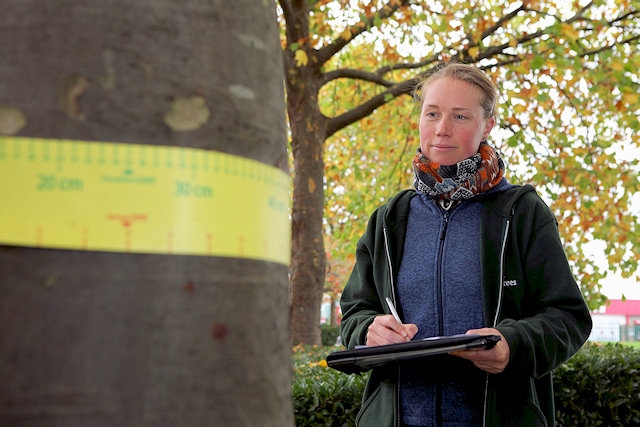UK’s largest ever i-tree survey highlights the £33million value of Greater Manchester’s trees
Date published: 04 December 2018

City of Trees, Greater Manchester’s Community Forest Trust itree eco survey
City of Trees, Greater Manchester’s Community Forest Trust has completed the biggest i-tree eco survey of its kind in the UK.
Data has been collected from more than 6,000 trees across Greater Manchester by a team of 57 surveyors who visited 2,000 plots – to help calculate the environmental and economic benefits that trees provide, as well as highlight any risks to tree health.
The results show that there are an estimated 11.3 million trees in Greater Manchester totalling 15.7 per cent tree canopy plus a further 7.8 per cent shrub cover giving a total canopy of 23.5 per cent.
And these trees act as a filtration system for harmful air pollutants – removing 847 tonnes of pollutants each year. They assist with excessive storm water, intercepting 56,530 tonnes of storm water run-off per year. Added to this they sequester 56,530 tonnes of carbon each year and the current carbon of all the trees in the region is 1.5 million tonnes.
Replacing these services that the trees provide would cost the region the equivalent to £33.3 million.
The survey was carried out across Greater Manchester this summer and autumn in one of the world’s largest citizen science projects ever, collecting data such as tree species, width, height and diameter.
The data is fed into the i-tree software system, which processes the information and provides insightful results about the economic value of trees, trees under threat and where there is potential to plant more.
Results include:
- It would cost £4.7 billion to replace all Greater Manchester’s trees
- Greater Manchester’s trees produce 122,450 tonnes of oxygen each year
- The most common species of tree in Greater Manchester are Hawthorn, Sycamore and English Oak
The data can be used to protect existing trees, as well as identifying new land for planting – assisting with strategies such as The Northern Forest and the Greater Manchester Spatial Framework. The results will inform the Greater Manchester Tree and Woodland Strategy, which will be published in spring next year.
The data also highlights trees at risk. There are 892,924 (7.9 per cent) trees in danger of being lost due to Ash Dieback disease in Greater Manchester.
Laurence Adams is one of 57 tree surveyors who has spent the last few months in various parts of Greater Manchester researching.
With no formal background in environmental science, Laurence worked in small teams with other surveyors, who were often trained ecologists.
The teams were given allocated plots each day, in one geographical area, such as Rochdale and they would travel to the GPS points on the map and then survey all the trees in an 11.3 metre radius around that point.
Laurence said: “Sometimes you would be in a surburban area and you would find street trees or you would need to access people’s back gardens to survey the trees there. Other times the location might be on the edge of the motorway and you would have to find a way of surveying those trees. At one point as we were right on the edge of the M62.
“We took measurements such as tree height, the size and condition of the tree crown, the thickness of the trunks, the estimated age of the tree and species as well as, whether there was any other space around the tree to plant more.
“Sometimes the trees would be on their own but there were instances where teams would find a group of trees together which may take up to two days to survey.
“It’s a fascinating project and I am much more familiar with trees now, than when I started. I think oak trees are my favourite. They are the kings of the forest, among the biggest, strongest and slowest growers and they are connected to our heritage.
“Putting aside their environmental benefits, being around trees is also one of our best ways to re-connect with nature in the city and, speaking as a relative beginner, the more you learn about them, the more you realise what fascinating creatures they are. It's really important that we share our streets and green spaces with them.”
Do you have a story for us?
Let us know by emailing news@rochdaleonline.co.uk
All contact will be treated in confidence.
Most Viewed News Stories
- 1The plan for two new apartment blocks with an unusual car parking system
- 2Andy Burnham responds to harrowing reports from hospital nurses
- 3Police seize £48,000 in Rochdale property search
- 4The museum undergoing £8.5m transformation now needs a new roof
- 5Residents urged to be vigilant after spike in Shawclough burglaries
To contact the Rochdale Online news desk, email news@rochdaleonline.co.uk or visit our news submission page.
To get the latest news on your desktop or mobile, follow Rochdale Online on Twitter and Facebook.

